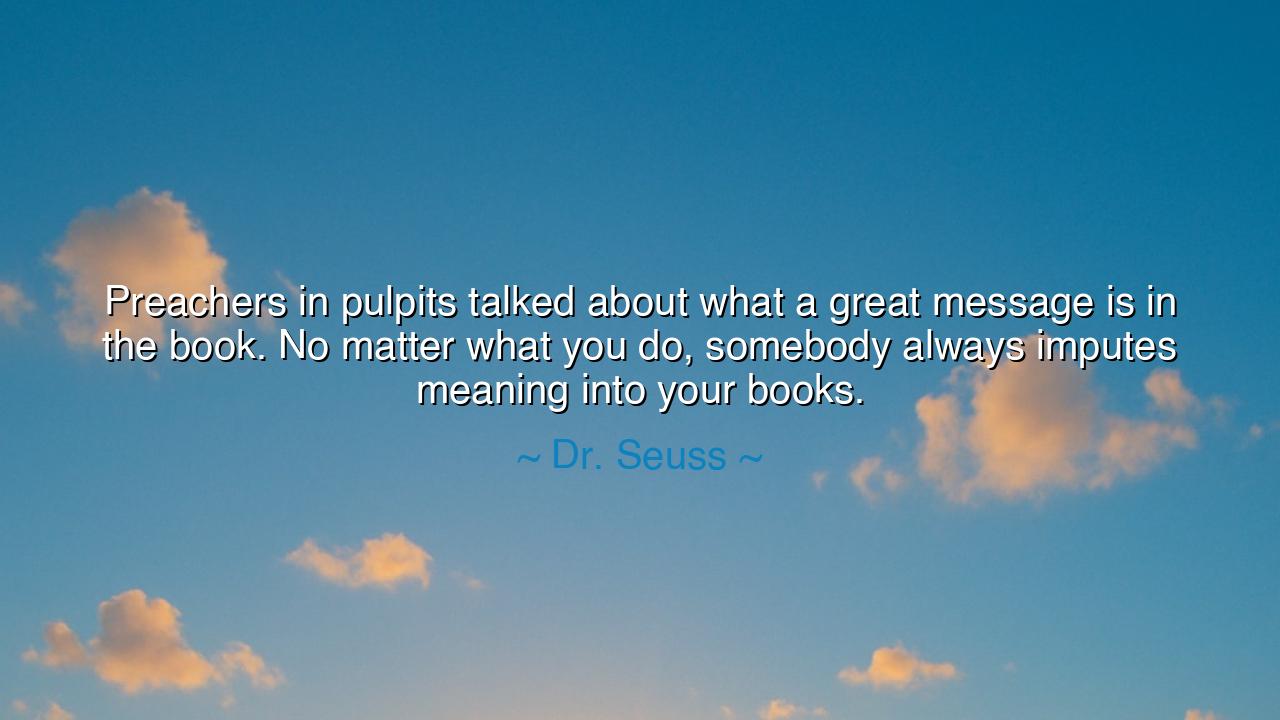
Preachers in pulpits talked about what a great message is in the
Preachers in pulpits talked about what a great message is in the book. No matter what you do, somebody always imputes meaning into your books.






The beloved storyteller Dr. Seuss, whose rhymes carried wisdom hidden beneath whimsy, once reflected upon his own creations and said: “Preachers in pulpits talked about what a great message is in the book. No matter what you do, somebody always imputes meaning into your books.” In these words lies a truth as old as art itself — that once a story leaves its creator’s hands, it becomes the world’s, and the world will fill it with meanings the author never dreamed. The poet may write in play, but the people will find prophecy. The painter may color for joy, but generations will see the face of God in his brushstrokes. For human beings are creatures of meaning, forever seeking mirrors of their souls in every tale told beneath the sun.
When Dr. Seuss spoke these words, he was marveling — perhaps with a touch of amusement — at how his playful stories for children had been elevated into moral scripture by grown-ups. His books of imagination, written to delight the young, were being expounded in pulpits as allegories of faith, ethics, and philosophy. The Lorax was read as a warning of environmental greed, The Sneetches as a sermon against prejudice, Horton Hears a Who! as a testament to the sanctity of life and the voice of the voiceless. Seuss himself, a craftsman of nonsense and rhythm, had discovered what every creator eventually learns: that art escapes its maker, and that the audience will always discover in it more than the artist intended.
This truth reaches far beyond the pages of children’s books. In every age, the works of the great and the humble alike have been interpreted, transformed, and reborn through the eyes of others. Consider the plays of William Shakespeare — written to entertain the crowds of Elizabethan London, yet studied now as windows into the human condition. Consider Vincent van Gogh, who painted his anguish in color and was scorned in life, only to be hailed in death as a prophet of modern art. Or consider Mary Shelley, who wrote Frankenstein as a story of scientific hubris, yet whose creature has since come to embody loneliness, alienation, and the eternal question of what it means to be human. Each of these souls discovered, through time or posterity, that meaning is a living thing, forever growing beyond its roots.
There is a mystery here — the mystery of creation itself. When one makes art, one sows a seed into the fertile field of human consciousness. The seed may be small, may even seem trivial, yet once it takes root in the minds of others, it grows into forms the sower cannot predict. The author writes one truth; the reader discovers another. The teacher explains one lesson; the listener perceives ten. This is not theft, but transformation — the sacred dialogue between creator and world. It is proof that all art is a mirror, and in it every soul beholds its own reflection.
Yet Dr. Seuss’s words also carry a hint of caution, even humility. To those who create — writers, artists, thinkers — he reminds us: you cannot control how others will understand you. Once your work enters the world, it will live a life of its own. Some will praise it for meanings you never placed there; others will condemn it for meanings you never intended. The wise do not protest or cling, but accept this with grace. For the purpose of art is not to dictate, but to awaken; not to command meaning, but to inspire it. The beauty of language and image lies not in certainty, but in possibility.
Even in the ancient world, this truth was known. When Homer sang of Achilles and Odysseus, his audience heard not only tales of war and wanderings, but lessons of courage, fate, and homecoming. When Aesop told his fables of animals and fools, he too may have written in jest, yet his listeners carved moral codes from his simple stories. Thus from the playful to the profound, from Seuss’s rhyme to Homer’s epic, one lesson endures: the meaning of art is never fixed; it lives in the hearts of those who receive it.
And so, my friend, if you are a creator — of stories, of beauty, of life itself — take comfort and take care. Do your work with honesty, and then let it go. The world will see in it what it needs to see. Some will find wisdom, others hope, others merely a smile — and that, too, is holy. For as Dr. Seuss discovered, the measure of art’s power lies not in the mind of the maker, but in the endless interpretations of the human soul. Thus, live and create freely — and know that what you offer, though born of your hand, belongs forever to the wonder of the world.






AAdministratorAdministrator
Welcome, honored guests. Please leave a comment, we will respond soon